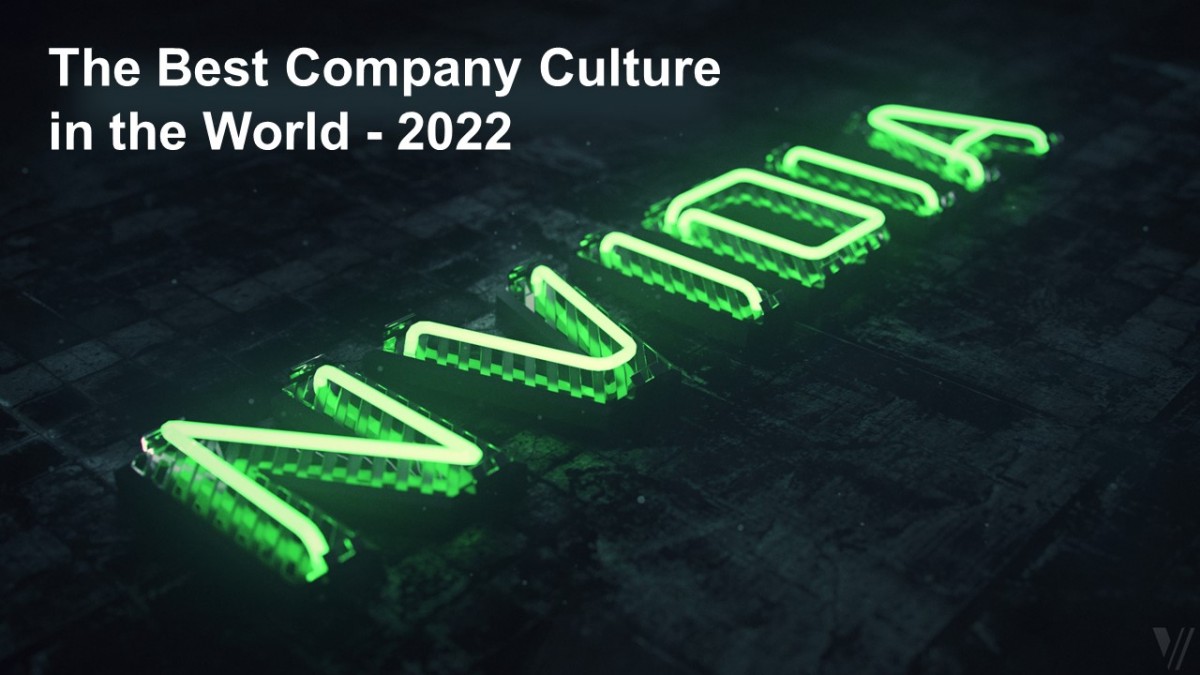Share:

You may have noticed that company culture is a hot topic at the moment.
With so many organizations and their employees having to navigate the shift to remote and hybrid work environments, there’s a general feeling, with some evidence to support this, that culture has suffered in the new normal.
Many organizations are struggling to get a handle on culture and employee engagement in a business environment of constant change and continued uncertainty. One company that seems to have gotten a handle on organizational culture is tech giant NVIDIA.
The best company culture belongs to NVIDIA, according to our research. Supporting this finding is the fact that the company ranked second on Glassdoor’s 2021 list of “Best Places to Work” list for large U.S. companies, which is based on anonymous feedback from current and former employees.
In this article, we will examine NVIDIA’s winning culture and the policies and practices that propelled it to the top of the list for best company culture for 2022.


Glassdoor’s Employee Choice Awards
Glassdoor is considered to be the worldwide leader on insights about jobs and companies. Their annual Employees’ Choice Awards list honors the “Best Places to Work” across the U.S. and four other countries.
Their method for compiling this list is unique because, unlike most other workplace awards, the rankings are based on the anonymous input of employees who voluntarily provide feedback on Glassdoor’s platform by completing a company review about their job, work environment, and employer over the past year.
There are six distinct categories, which include nods for the Best Places to Work across the U.S., Canada, United Kingdom, France, and Germany.
There are rankings for the 100 Best Places to Work, for employers with 1,000 or more employees, and the 50 Best Small & Medium Companies to Work For, acknowledging employers with fewer than 1,000 employees. Winners are picked based on their overall rating achieved during the past year using a 5-point scale.
The 2022 list of winners includes employers across a range of fields and industries, including biotech, consulting, finance, health care, pharmaceuticals, retail, technology, tourism, and travel, just to name a few.
With a 4.6 rating out of 5, NVIDIA has taken the top spot for the first time, and this is the eighth time the company has made the list.
Glassdoor’s CEO Christian Sutherland-Wong says, “The world of work is rapidly evolving, fueled by the pandemic and now millions of workers re-evaluating their expectations of employers. This year’s Best Places to Work winners are leading the way by listening and responding to employee feedback and reimagining the employee experience to truly put their people first,”
Sutherland-Wong adds, “It’s inspiring to see these employers step up during the pandemic to expand and grow company cultures where employees feel supported and valued in and out of work.”
NVIDIA: An Overview
NVIDIA is a tech company headquartered in Santa Clara, California, that designs and manufactures computer graphics cards for desktop and mobile systems in the areas of driverless cars and video games.
NVIDIA innovates at the intersection of graphics, high-performance computing, and artificial intelligence, and it employs more than 10,000 people.
The company’s corporate history provides some insight into how swiftly NVIDIA grew into a game-changer in the tech world.
The company was founded in 1993 by Jensen Huang, Chris Malachowsky, and Curtis Priem. These founders, with great foresight, strongly believed that the PC would one day become a consumer device for enjoying games and multimedia.
At the time of the company’s founding, there were over two dozen graphics chips companies, with that number climbing to 70 three years later. By 2006, NVIDIA was the only independent organization still in operation.
NVIDIA launched its first product, NV1, in 1995. In 1999, the company invented the graphics processing unit (GPU), which would reshape the industry and revolutionize PC gaming.
The company’s work in accelerated computing is transforming transportation, healthcare, manufacturing, and other areas.
NVIDIA’s Culture

On its website, NVIDIA states that it values agility, collaboration, innovation, integrity, and performance, and Culture 500 analysis seems to confirm this.
The Culture 500 gives a data-based view of company culture within some of the largest, most powerful companies in the world. It is a metric powered by both cutting-edge AI and human expertise. This interactive tool and data set are updated annually to show how companies measure up on culture, based on employee perceptions.
An analysis by CultureX, which created The Culture 500 with the MIT Sloan Management Review and Glassdoor, ranks NVIDIA on these values:
Agility: Nvidia is in the 100th percentile across the Culture 500 sample
Collaboration: Nvidia is in the 85th percentile across the Culture 500 sample
Innovation: Nvidia is in the 100th percentile across the Culture 500 sample
Integrity: Nvidia is in the 99th percentile across the Culture 500 sample
Performance: Nvidia is in the 99th percentile across the Culture 500 sample
Based on this analysis, NVIDIA employees believe the company is authentic about its values and “walks the talk” when it comes to agility, collaboration, innovation, integrity, and performance.
On the subject of corporate social responsibility, NVIDIA has taken a people-focused approach, declaring: “We make people our first priority, empowered by technology that makes a positive impact on humanity and the world around us.”
Employees have described the work they do at NVIDIA as “challenging and meaningful, with great compensation and a democratic culture.”
On their “About Us” webpage, NVIDIA describes themselves thusly: “We’re one team solving the world’s visual computing challenges.” This is underscored by their collaborative approach to work.
The webpage says, “There’s only one team at NVIDIA. That means no politics, no hierarchy. Reporting lines exist, but teams form around projects based on the skills that are required.”
NVIDIA is actively investing in the “bottom-up, grassroots growth of the metaverse” by offering free software licenses to individual creators. This approach demonstrates a collaborative effort that extends beyond the company and into the community and clients the company serves, boosting the company’s reputation with the public.


NVIDIA’s Culture
According to Glassdoor reviews, NVIDIA received an impressive 4.7 out of five stars.
Reviews from current and former employees revealed that 95% of NVIDIA employees say it is a great place to work and would recommend it to their friends, compared to 59% of employees in typical U.S.-based companies, with 96% claiming management at the company is honest and ethical in its business practices.
One employee wrote, “Leaders walk the talk with culture and values.” As we’ve stated before, this level of dedication from leadership is key to building a strong organizational culture.
Perhaps the most surprising figure gathered from the reviews NVIDIA’s employees have provided, is 98% of employees approve of the company’s CEO Jensen Huang.
One NVIDIA employee claimed, “NVIDIA’s culture promotes authenticity. Employees are made to feel comfortable bringing their true selves to work. I am so grateful for the abundance of opportunities and strong mentors I have. I have grown immensely, personally and professionally.”
Authenticity from leadership is key to building a winning culture that engages and retains employees and makes them feel valued.
The company takes a risk-averse approach, which shows their commitment to sustainable strategies: “As a leading technology innovator, we continuously take risks and regard failure as a step toward success.”
Being risk-averse and unafraid of making mistakes is a sustainable business strategy that is so important to ensuring a business is agile enough to weather an environment of constant change and ensures future success.
The company also expresses a strong commitment to the well-being of their employees:
“We’re committed to fostering a culture where talented employees can do their life’s work. We provide excellent pay and terrific benefits. Employees enjoy a relaxed setting, with a flexible approach to time off. And they and their families have access to the groundbreaking Stanford Health Navigator service, among other perks.”
Demonstrating this level of care for employees and investing in their wellness boosts employee engagement and retention. NVIDIA extends this care to the communities they serve and has one of the corporate world’s only employee-run charitable foundations.
This provides a sense of purpose for employees and helps them feel that they are making a real difference in the world.
Why Organizational Culture is so Important
Organizational culture is the most important, yet often under-appreciated value driver of a company and has a tremendous impact on productivity, ethical compliance, innovation, performance, and long-term success.
According to an article from the Journal of Management Studies, as regulation has proved increasingly inadequate at correcting market failures, appropriately defined notions of corporate purpose can improve not only social outcomes but also enhance the functioning of organizations and markets.
Corporate culture seems to be the biggest factor driving employee satisfaction… or dissatisfaction.
Recent research from the Sloan School of Management at MIT revealed that over 40% of all employees were thinking about leaving their jobs at the beginning of 2021.
Between April and September of 2021, an all-time record of over 24 million U.S. employees left their jobs. Despite its high marks for culture, NVIDIA has not been immune to this trend.
Weathering the Great Resignation
Surprisingly, even with high marks for culture from past and current employees, NVIDIA and other innovative companies such as Netflix, SpaceX, and Tesla are experiencing higher attrition rates than some of the competitors.
With such stellar reviews for culture, why is this?
The Sloan research has revealed that even more than wage dissatisfaction, corporate culture is a more reliable predictor of attrition. Though it seems surprising that a company so beloved by employees would experience high turnover, it may be attributed to the high-stress and long hours associated with jobs at innovative companies.
This research has shown that employees are more likely to leave innovative companies. Surprisingly, the more positively employees talked about innovation at their companies, the more likely they were to quit.
The researchers put these findings into focus by claiming, “Staying at the bleeding edge of innovation typically requires employees to put in longer hours, work at a faster pace, and endure more stress than they would in a slower-moving company. The work may be exciting and satisfying but also difficult to sustain in the long term.”
Additionally, while employees may praise their company’s innovation, they may be more likely to speak negatively about work-life balance and manageable workloads.
It can be assumed that in light of the COVID-19 pandemic, employees are reassessing their needs and opting for jobs that take less of a personal toll on their health and well-being than innovative companies take.
The authors have cited lateral career opportunities, remote work arrangements, company-sponsored social events, and predictable schedules as leading predictors of retention for Culture 500 companies from April to September 2021.
This just highlights that, even when you have a winning culture with tremendous buy-in from employees, work-life balance may be the hardest aspect of organizational culture to manage and an aspect of organizational culture that leadership must work at continuously to keep employees engaged and satisfied with the work they do.

Matt Tenney has been working to help organizations develop leaders who improve employee engagement and performance since 2012. He is the author of three leadership books, including the groundbreaking, highly acclaimed book Inspire Greatness: How to Motivate Employees with a Simple, Repeatable, Scalable Process.
Matt’s ideas have been featured in major media outlets and his clients include numerous national associations and Fortune 500 companies.
He is often invited to deliver keynote speeches at conferences and leadership meetings, and is known for delivering valuable, actionable insights in a way that is memorable and deeply inspiring.


